Select Language
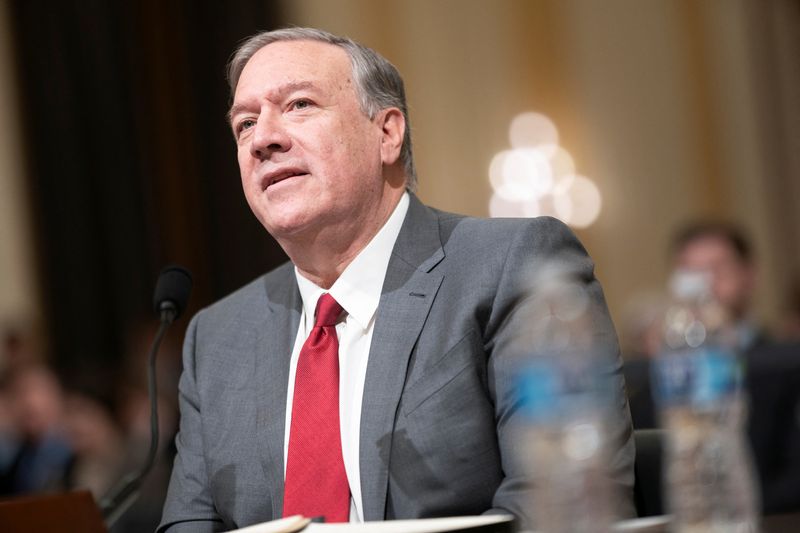
By Patricia Zengerle
WASHINGTON (Reuters) - Former U.S. President Donald Trump's secretary of state, Mike Pompeo, added his voice on Monday to growing calls from prominent Republicans to pass billions of dollars in aid for Ukraine, after some party members accused aid opponents of succumbing to Russian propaganda.
Democratic President Joe Biden's request for $95 billion for Ukraine, Israel and other allies passed the U.S. Senate with 70% support but has been stalled for weeks in the House of Representatives as Republican House Speaker Mike Johnson has refused to allow a vote.
As lawmakers returned to Washington from a two-week break on Monday, Johnson gave no word of any plans for a vote on Biden's supplemental request.
Pompeo, a former House member, issued a public letter on Monday urging Johnson to bring up the bill in the House.
"We encourage you to lead with conviction and bring the aid package to a vote," Pompeo said in a letter written with John Walter, president of the Hudson (NYSE:HUD) Institute, where Pompeo is a fellow.
Johnson's office did not comment on the letter, or recent assertions by the Republican chairpersons of two House national security committees that "Russian propaganda" is influencing party members.
Representative Michael McCaul, who leads the House Foreign Affairs Committee, told Puck News last week: "Russian propaganda has made its way into the United States, unfortunately, and it’s infected a good chunk of my party’s base."
And on Sunday, Representative Mike Turner, who heads the House Intelligence Committee, told CNN's "State of the Union" McCaul's contention was "absolutely true."
Turner said: "We see directly coming from Russia attempts to mask communications that are anti-Ukraine and pro-Russia messages, some of which we even hear being uttered on the House floor."
For example, Turner said some members of Congress "incorrectly" say that the conflict between Russia and Ukraine is over NATO.
"To the extent that this propaganda takes hold, it makes it more difficult for us to really see this as an authoritarian versus democracy battle," Turner said.
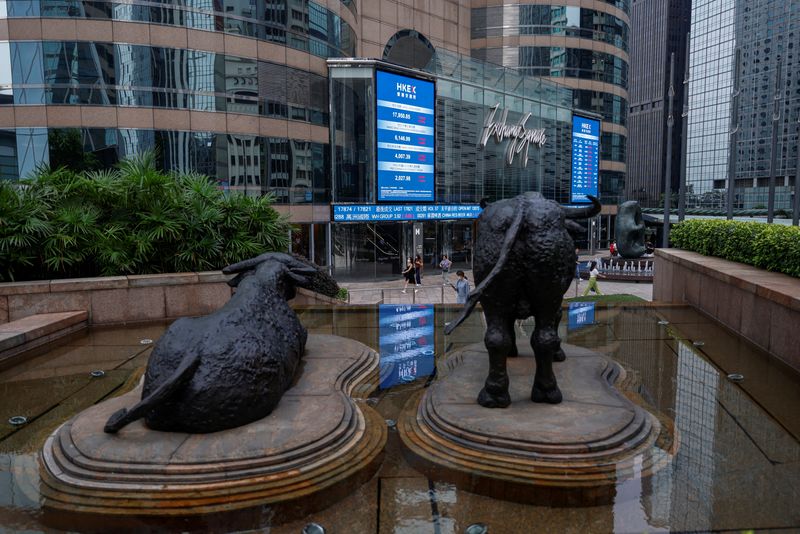
By Tom Westbrook
SINGAPORE (Reuters) - Industrial metals prices extended their gains on Tuesday with expectations of a worldwide manufacturing rebound, while Asian shares crept up a little more cautiously ahead of this week's U.S. inflation data and a crucial European Central Bank meeting.
MSCI's broadest index of Asia-Pacific shares outside Japan rose 0.2%. Japan's Nikkei rose 0.6%.
Shanghai copper futures were up 1% at a two-year high and have gained more than 10% in a month. Zinc made a five-month high in Shanghai, where Aluminium made a 22-month peak on Monday. [MET/L]
Even iron ore, battered by China's property downturn, steadied above $100 a tonne in Singapore. [IRONORE/]
"It's pretty much a China bet," said Vishnu Varathan, head of economics at Mizuho Bank in Singapore.
"It's coincided with a global manufacturing bottoming, and I think that plays well into China's industrial recovery. That aspect of it is a broader-based story for metals."
On Monday, data showed German industrial production rising more than expected in February.
Last week, data showed U.S. manufacturing growing for the first time in one-and-a-half years. China's manufacturing activity expanded for the first time in six months in March.
Precious metals have been soaring, too, with gold hovering just below a record high of $2,353 hit on Monday. Spot gold has risen nearly 14% this year. [GOL/]
Silver hit its highest since mid-2021 on Monday and platinum has also shot higher. Brent crude is below recent peaks but clinging above $90 a barrel at $90.62.
Chinese stocks have not joined the party, though Hong Kong's Hang Seng was 1.2% higher in early trade and China proxies such as the Antipodean currencies have been rallying.
The Australian dollar is up almost 2% in a week and traded at $0.6605 on Tuesday. The New Zealand dollar has regained a footing above $0.60 and hit a two-week high of $0.6047 in morning trade.
China's yuan, down about 1.8% this year, has found a floor around 7.3 to the dollar.
CPI AND ECB AHEAD
For global stock markets, bonds and currencies, the main focus this week is on U.S. inflation data due on Wednesday and the European Central Bank meeting on Thursday.
Expectations for U.S. rate cuts have been evaporating and where in January markets had expected more than 150 basis points in cuts, investors now are not even sure of half that many.
Annualised headline U.S. inflation is seen rising to 3.4% in March from 3.2% a month earlier. U.S. two-year yields, which track short-term interest rate expectations, are their highest since late November at 4.801%, while ten-year yields also hit 2024 highs of 4.46% on Monday.
The dollar has struggled to follow the rates higher, however, with the euro firm in case of a hawkish surprise from the ECB and the commodity currencies rallying.
The euro is at $1.0860.
The ECB is expected to hold interest rates, but flag a cut the markets have priced for June.
"A stabilisation around $1.0800 in the near term remains likely in EUR/USD, although drops to $1.07 or lower look more likely than a break higher to $1.09/1.10," strategists at ING said.
The yen, meanwhile, continues to face heavy pressure as investors see any lags in global rate cuts as leaving the gap open wide with Japan's near-zero interest rates.
At 151.87 per dollar, the yen is a whisker from last month's 34-year low of 151.975. Against the euro, the yen is at its weakest for three weeks at 164.96.
Japanese Finance Minister Shunichi Suzuki said authorities will not rule out any options in dealing with excessive yen moves, repeating his warning that Tokyo is ready to act against the currency's recent sharp declines.
"We expect (Japan) to intervene above 152, but not immediately on a break," Standard Chartered (OTC:SCBFF) strategist Steve Englander said in a note to clients.

By Steve Holland and Stephanie Kelly
MADISON, Wisconsin (Reuters) -President Joe Biden announced on Monday plans to ease student debt that would benefit at least 23 million Americans, addressing a key issue for young voters whose support he needs as he seeks re-election in November.
The plans, which the Democratic president detailed in Madison, Wisconsin, include cancelling up to $20,000 of accrued and capitalized interest for borrowers, regardless of income, which Biden's administration estimates would eliminate the entirety of that interest for 23 million borrowers.
Progressive voters, whom Biden hopes will support him against Republican challenger Donald Trump, have long urged the White House to address student loan debt. Biden's administration has taken a string of actions despite the U.S. Supreme Court blocking his initial plan last year.
The issue remains high on the agenda of younger voters, many of whom have concerns about Biden's foreign policy on the war in Gaza and fault him for not achieving greater debt forgiveness. Republicans have called Biden's student loan forgiveness approach an overreach of his authority and an unfair benefit to college-educated borrowers while other borrowers received no such relief.
Biden's new plans include automatically cancelling debt for borrowers who are eligible for certain forgiveness programs, who entered repayment decades ago, who enrolled in low financial value programs, or who are experiencing hardship.
"This relief can be life changing," Biden said in Madison, just as the total solar eclipse in North America was gracing the region. "Folks, I will never stop delivering student loan relief for hard-working Americans... It's for the good of our economy."
He added that if he is re-elected in November's presidential election, he would push hard to make community college free.
If the latest plans are finalized following a public comment period, they would take effect as early as this fall, White House spokesperson Karine Jean-Pierre told reporters in a call detailing the plans. Combined with the administration's previous actions, they would benefit more than 30 million Americans, Jean-Pierre added.
U.S. Senator Bill Cassidy, the top Republican on the Senate education panel, said such "loan schemes" simply transfer the cost of the debt onto others.
"This is an unfair ploy to buy votes before an election and does absolutely nothing to address the high cost of education that puts young people right back into debt," Cassidy wrote in a statement.
To date, the administration has said it has approved $146 billion in student debt relief for 4 million Americans.
As of June 2023, approximately 43.4 million student loan recipients had $1.63 trillion in outstanding loans, according to the Federal Student Aid website.
"We're delivering as much relief as possible for as many borrowers as possible, as quickly as possible," U.S. Education Secretary Miguel Cardona said.
Biden has vowed to continue pushing student debt relief to as many borrowers as possible following the Supreme Court's decision blocking his earlier plan to cancel hundreds of billions of dollars in debt, and administration officials said they studied the 6-3 ruling in crafting the new plans.
Other administration officials were set to tout the new plans in events across the United States on Monday, including Vice President Kamala Harris in Philadelphia.
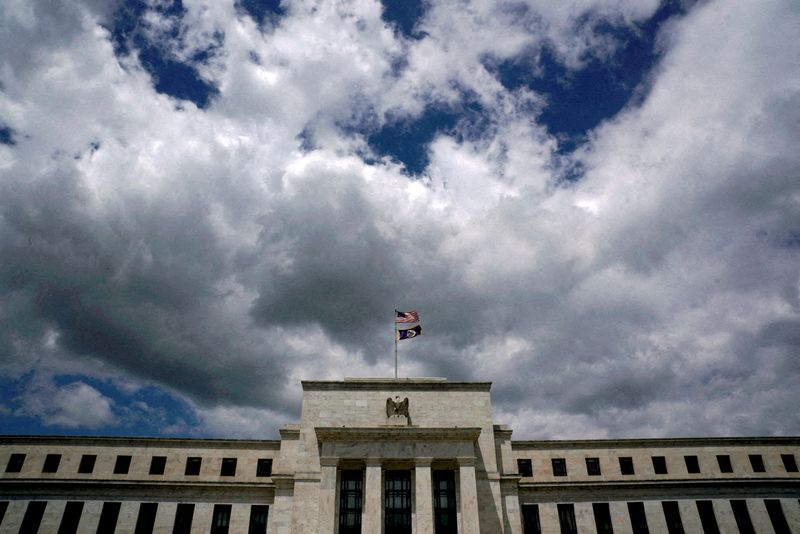
NEW YORK (Reuters) - Futures traders have reduced bets on how much the Federal Reserve will cut rates this year to the lowest level since October, LSEG data showed on Monday, amid evidence of continued strength in the U.S. economy.
Fed funds futures contracts for December on Monday reflected expectations of around 60 basis points in rate cuts this year, compared to some 150 basis points that had been priced at the start of 2024. The prospect of a first 25 basis point cut in June stood at 49%, down from 57% a week ago, CME Group (NASDAQ:CME) data showed on Monday.
Expectations for how deeply and how soon the Fed will cut rates have shifted rapidly over the last few months, as investors grow increasingly doubtful that policymakers will be able to lower borrowing costs without sparking an inflationary rebound in a strong economy. The Fed has projected it will cut rates by 75 basis points this year.
Treasury yields, which are swayed by interest rate expectations, have moved higher as a result. The benchmark 10-year yield, which moves inversely to bond prices, hit its highest level since November on Monday. Data on Friday showed unexpected strength in the labor market, the latest in a series of reports reflecting stronger-than-expected growth.
In January, policymakers introduced language saying they would keep the policy rate in its current 5.25%-5.5% range until they have "greater confidence" that inflation is headed to the Fed's 2% goal.
The combination of strong data and limited progress on inflation in the last couple of months has amplified the calls among top officials - including Chair Jerome Powell - to be "patient" as they approach the decision on when to cut rates.
Investors will be closely watching the Consumer Price Index for March, which will be released on Wednesday, to further assess the chances of rate cuts this year.
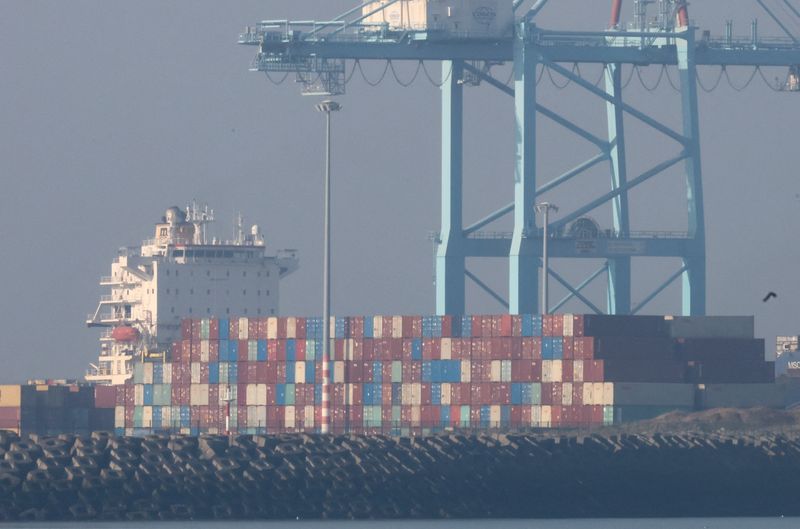
By Maria Martinez
(Reuters) - German exports fell more than expected in February, as exports to European Union countries dropped, data from the Federal Statistics Office showed on Monday.
Exports declined by 2% month-on-month in February and were lower than the forecast for a 0.5% decrease in a Reuters poll.
Imports were up 3.2% on the month, the statistics office said.
The foreign trade balance showed a surplus of 21.4 billion euros ($23.17 billion) in February, down from 27.6 billion euros in January and 16.9 billion euros in February 2023.
Exports to EU countries dropped by 3.9% on the month, while exports to third countries increased by 0.4%.
Exports of goods to the United States were up 10.2% compared with January, while exports to China decreased by 0.6% on the month.
"German trade is experiencing shifts in global trade and geopolitical tensions," said Carsten Brzeski, global head of macro at ING.
($1 = 0.9234 euros)
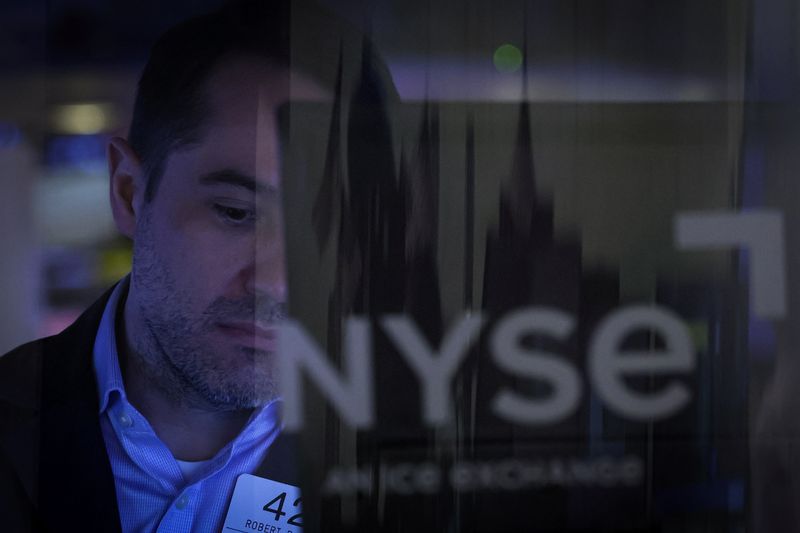
Investing.com -- U.S. inflation data will be in sharp focus in the coming week after Friday’s blowout jobs report raised the prospect that the Federal Reserve may delay interest rate cuts for longer. Big banks kick off earnings season, the European Central Bank is to meet and geopolitical risks look set to continue to support oil prices. Here’s what you need to know to start your week.
U.S. inflation data
The U.S. is to release consumer price inflation figures for March on Wednesday with economists expecting core inflation, which strips out food and fuel costs, to slow to 3.7% year-over-year from 3.8% the prior month.
Data on producer prices on Thursday is expected to point to a more moderate increase.
The inflation data comes after numbers out on Friday showed the U.S. economy added far more jobs than expected last month while wages rose at a steady rate, indicating that the pace of inflation may be slow to moderate.
The combination of strong employment data and slow progress on inflation in the last couple of months has amplified the calls among top Fed officials - including Chair Jerome Powell - to be "patient" as they approach the decision on when to cut rates.
Fed minutes, speakers
The Fed is to release the minutes of its March meeting on Wednesday where officials continued to expect three cuts for this year albeit with less conviction relative to their forecast from the end of last year.
In the wake of Friday’s jobs data money markets are now pricing in two rate cuts this year, down from three previously.
Market watchers will also get the chance to hear from New York Fed President John Williams on Thursday.
On Friday Fed Governor Michelle Bowman downplayed any urgency to cutting rates and warned that should progress on inflation stall that might even push the central bank to raise rates again.
Earnings
Quarterly reports from major banks will kick off earnings season in earnest on Friday.
Investors are counting on robust corporate profit this year to support rising valuations as the stock market has rallied to record highs.
The S&P 500 is up more than 9% year-to-date, following its strongest first-quarter performance since 2019. But the bar may be rising for stocks to keep advancing at that pace, increasing pressure on companies to deliver strong results.
Investors will also listen for companies’ views on the economy and inflation.
JPMorgan Chase (NYSE:JPM), Citigroup Inc (NYSE:C) and Wells Fargo (NYSE:WFC) all report results on Friday. Delta Air Lines (NYSE:DAL) and BlackRock (NYSE:BLK) are among other big names set to provide quarterly updates during the week.
Oil prices
Oil prices notched up a second weekly gain last week, supported by geopolitical tensions in the Middle East, concerns over tightening supply and expectations about demand growth.
Crude oil settled at its highest levels since October on Friday. U.S. crude futures rose 32 cents to $86.91 a barrel, while Brent settled up 52 cents at $91.17 a barrel.
Geopolitical tensions look set to continue to underpin oil prices as markets watch for any signs of any direct conflict between Iran, the third-largest OPEC producer, and Israel that could further tighten supplies.
"If Iran directly attacks Israel, that's never happened before," Phil Flynn, an analyst at Price Futures Group told Reuters. "It's just another geopolitical risk domino about to fall."
ECB meeting
The ECB meets on Thursday and is widely expected to hold rates steady before it embarks on a rate cutting cycle in June.
Markets see an almost 100% chance of a 25 basis-point cut in June so President Christine Lagarde’s comments will be closely watched for a green light.
A flurry of policymakers have explicitly pointed to June as the date of a first move and the latest data showed that Eurozone unexpectedly fell to 2.4% in March cementing expectations for a rate cut.
Apart from the ECB central bankers in Canada and New Zealand meet on Wednesday and in Singapore and South Korea on Friday with no rate changes expected.
(Reuters contributed reporting)
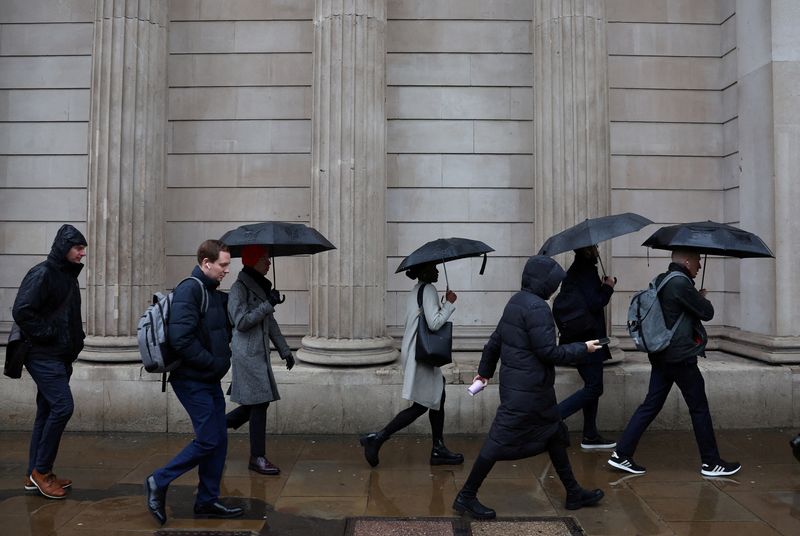
By David Milliken
LONDON (Reuters) - Starting salaries for permanent staff grew at the slowest rate in over three years last month and spending on temporary workers fell by the most since July 2020, recruiters said on Monday, adding to signs of a slowdown in Britain's job market.
March's survey from the Recruitment and Employment Confederation may help convince Bank of England policymakers that underlying pay pressures in the economy are easing sufficiently to keep inflation at its 2% target.
Official measures of pay growth have been rising at an annual rate of around 6%, roughly double the pace most BoE officials think is consistent with on-target inflation.
"The data here should support a decision by the Bank of England's Monetary Policy Committee to loosen its grip on growth in the near-term future. Pay growth has slowed significantly, and is now below the survey's long-term average for new permanent roles," REC Chief Executive Neil Carberry said.
However, the BoE has been reluctant to put too much weight on REC data in recent months, as the trends it has shown in the recruitment market have been slow to translate into lower wage growth for the broader workforce.
Last week a BoE survey of employers showed firms expected to raise pay by 4.9% over the next 12 months.
Financial markets predict the BoE will start cutting rates in June or August, with nearly 0.75 percentage points of cuts priced in for 2024.
REC said overall demand for staff fell for a fifth month in a row in March, and by almost as much as in February, when demand dropped by the most in more than three years.
Downward pressure on pay was caused by a greater supply of candidates, partly because of increased redundancies, it added.
REC's data is based on a survey of around 400 recruitment agencies between March 12 and March 22.

By David Milliken
LONDON (Reuters) - Concern among large British companies about economic uncertainty has fallen to its lowest since mid-2021 but the improved mood is not yet translating into stronger investment, a Deloitte survey showed on Monday.
Britain's economy entered a shallow recession in the second half of last year although recently published surveys have suggested there will be a modest return to growth in the first quarter of 2024.
"Uncertainties driven by Brexit, the pandemic and inflation that have clouded the business scene for much of the last eight years seem to be clearing," Deloitte chief economist Ian Stewart said.
Profit margins were forecast to rise for the first time in three years and overall optimism increased for a third quarter in a row to levels similar to those just before periods of relatively strong growth in 2010, 2014 and 2021.
Despite this, businesses were more focused on reducing costs and building up cash reserves than longer-term investment.
"Expansionary strategies, such as capital spending and bringing in new products or services, are on the backburner. Given the challenges of recent years it is perhaps unsurprising that ... a degree of caution persists," Stewart said.
Geopolitics remained the biggest worry of large companies, due to fears of increased cyber attacks or higher energy prices and a general fall in demand.
Concern about British productivity and competitiveness rose to second spot - the highest in a decade - displacing disquiet about inflation, energy prices and labour shortages.
Executives expected inflation in a year's time to fall to 2.9%, down from a prediction of 3.5% three months ago, allowing the Bank of England to cut interest rates to 4.25% from 5.25% over the next 12 months
The survey is based on responses between March 12 and March 25 from chief financial officers at 64 large British companies and subsidiaries of multinationals. The British companies have a market capitalisation of 200 billion pounds ($252 billion), equivalent to 8% of the stock market.
($1 = 0.7946 pounds)
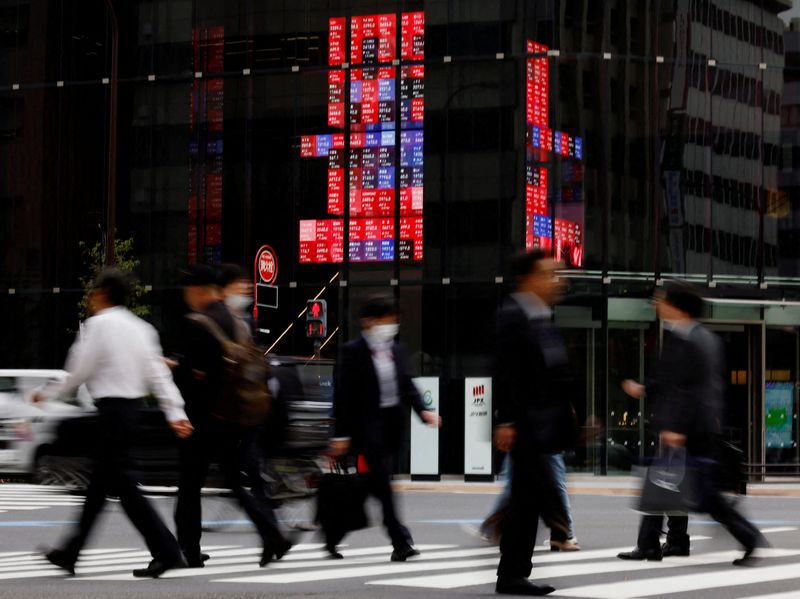
TOKYO (Reuters) - Japanese workers' real wages fell in February for a 23rd consecutive month, data showed on Monday, suggesting higher prices kept up pressure on consumers' spending appetite.
The wage trend is among the key data the Bank of Japan examines for pay and inflation outlooks, crucial factors for the central bank to consider in deciding whether to unwind its stimulus policy further.
Inflation-adjusted real wages, a barometer of consumer purchasing power, fell 1.3% in February from a year earlier, down for 23 straight months, data from the labour ministry showed. It followed a revised decline of 1.1% in January.
The consumer inflation rate the government uses to calculate real wages, which includes fresh food prices but excludes rent or equivalent, grew 3.3%, accelerating from 2.5% in January.
But nominal pay grew at 1.8% in February on the year, for its fastest increase since last June.
"We will monitor how growth in nominal pay will develop while price gains are weighing down real wages," a ministry official said.
Japanese firms agreed to raise wages 5.24% this year, the biggest increase in 33 years, a survey by the nation's largest union group Rengo showed last week.
Regular or base salary in February grew 2.2% from a year earlier, faster than a revised figure in the previous month, the ministry said.
Special payments, which include bonuses, slipped 5.5% year-on-year after a revised 12.4% gain in January.
Last month the BOJ scrapped eight years of negative interest rates and other remnants of its unorthodox policy, in a historic shift away from its focus on reflating growth with decades of massive monetary stimulus.
Here is preliminary data for monthly incomes and number of workers in February: ----------------------------------------------------------------
Payments (amount) (yr/yr % change)
-Total cash earnings 282,265 yen ($1,865.84) +1.8
-Monthly wage 277,479 yen +2.0
-Regular pay 258,319 yen +2.2
-Overtime pay 19,160 yen -1.0
-Special payments 4,786 yen -5.5
----------------------------------------------------------------
Number of workers (million) (yr/yr % change)
Overall 50.236 +1.3
-General employees 34.821 +3.5
-Part-time employees 15.415 -3.6
----------------------------------------------------------------
The labour ministry defines "workers" as 1) those employed for more than one month at a company that employs more than five people, or 2) those employed on a daily basis or had less than a one-month contract but had worked more than 18 days during the two months before the survey was conducted, at a company that employs more than five people.
To view the full tables, see the labour ministry's website at:
($1=151.2800 yen)
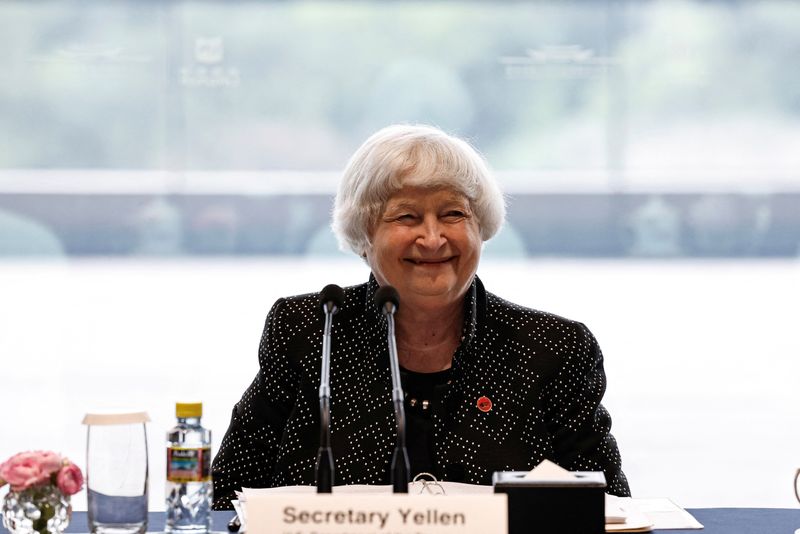
GUANGZHOU (Reuters) - U.S. Treasury Secretary Janet Yellen said on Friday that the United States and China have worked on an exercise for jointly dealing with a large bank failure in either country.
"We've held technical exchanges between our sides, including an exercise on how we would jointly deal with the failure of a large bank in the U.S. or in China," Yellen said in a question and answer session at an American Chamber of Commerce event in the city of Guangzhou.
Yellen made the comment about the joint work between the two sides to model financial risks from a potential bank failure as an example of the recent cooperative work between the two countries.

